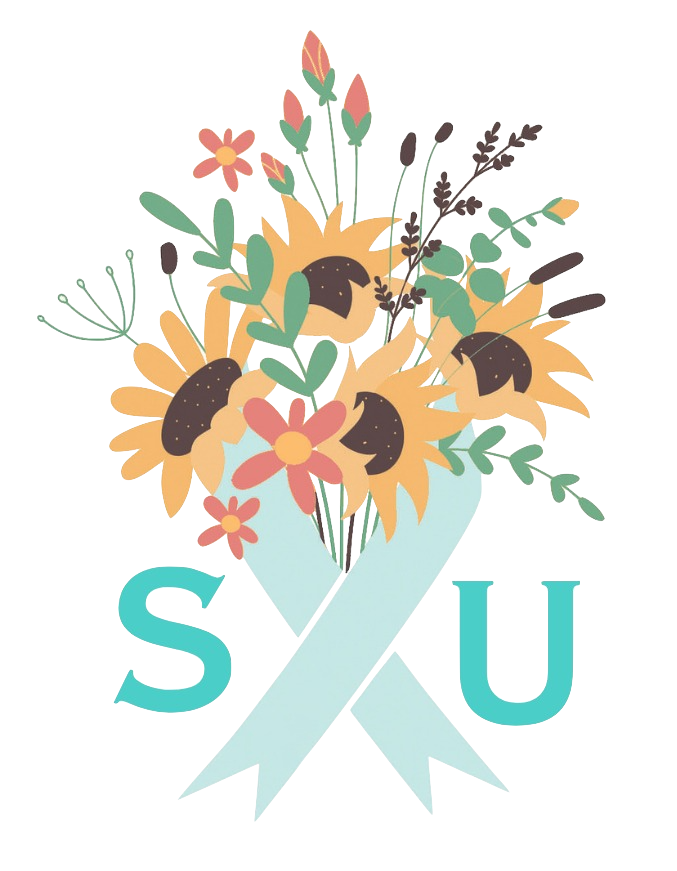Alayna Roberts
Chicago, Illinois (United States)
ALAYNA ROBERTS
Scleroderma Stories Issue 5
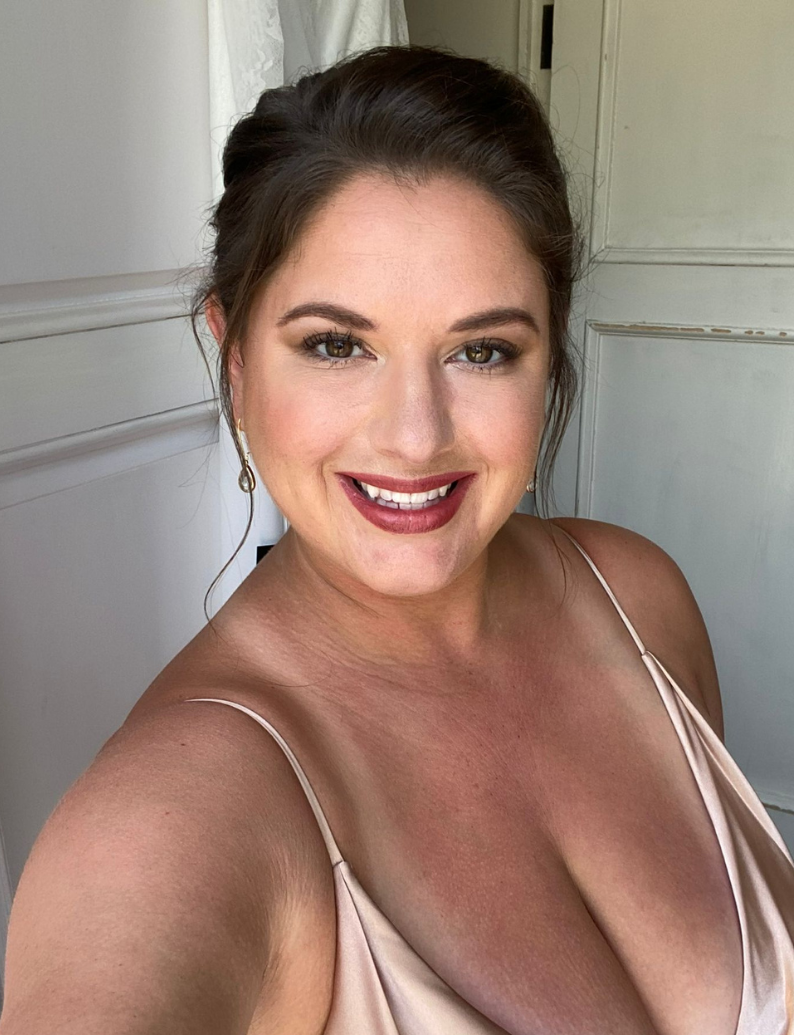
Please introduce yourself
My name is Alayna Roberts. I live in Chicago, Illinois. I’m 37 years old, and I’ve been living with scleroderma since 2015. I live with my cat and dog (my little family), and they’re super important to me. I work as a data scientist. I love sports, fitness, and being active.
How were you diagnosed with scleroderma?
It all started back in 2015 with my hands. I had an ‘attack’ where my fingers turned white and numb, and it was incredibly painful. It got to the point where my right index finger started turning black. Doctors told me, “Oh, you’ll probably have to amputate it. We don’t know what this is.” I went to like nine different doctors before one told me, “Oh, this is Raynauds. No, you’re not going to have to amputate your finger. We can treat you.”
Shortly after that, in June of 2015, I got the diagnosis of undifferentiated connective tissue disease, UCDT. For eight years I’d known about this, but I always thought that everything that I had was pointing to Scleroderma. I had Raynaud’s, GERD, and had started to get some hyper pigmentation on my face and some joint pain as well.
So in 2021, I finally made an appointment at the Scleroderma Clinic at Northwestern in downtown Chicago and saw Dr. Correia. It was actually his last day at the Clinic, and he was like “Yep, you have scleroderma.” And so I’ve been a part of that clinic ever since.
Have your symptoms progressed since then?
So far, it hasn’t progressed to any organ involvement. Right now I have limited systemic sclerosis, but my doctors said that can change any time. They’ve seen people switch from limited to diffuse. Thankfully, it’s still limited. I’m really only dealing with Raynaud’s and GERD. And then every so often I’ll get aches, pains, flares, and joint pain. I feel like I’ve been pretty lucky. And now, being at the clinic, I get checkups every six months or every year for heart and lungs such as echocardiograms, PFTs, etc. so I feel like I’m in good hands if I do start to see some organ involvement.
Also, thanks to all the lung tests they do, I found out that I have asthma. I had no idea. I just thought I was breathing heavier while working out like everyone does. I’ve gone my whole life thinking it was normal, and they’re like, “Oh, yeah… You have asthma, though,” so it’s kind of funny that a lot of times with one chronic illness, there’s others you have along with it.
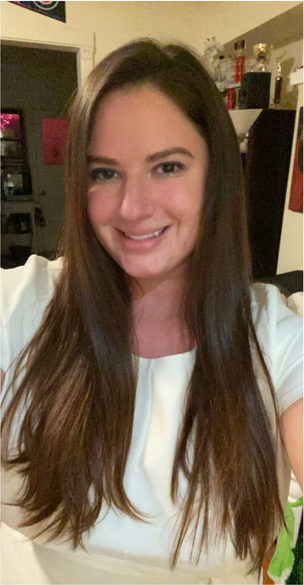
How have you learned more about the condition?
When I got diagnosed with the UCTD in 2015, I’d looked at where that falls with autoimmune diseases. There’s the big three rheumatological diseases: scleroderma, rheumatoid arthritis, and lupus. UCTD has bits and pieces from all of them. So I learned a little bit, and then I kind of stopped because it was all too scary for me at the time, just reading about all the horrible things that can happen. I’ve also got general anxiety disorder. That’s why sometimes it’s hard to read about this stuff because then I can put myself in a panic attack, thinking about my future and all the potential horrible things that could come with it. I was trying to remind myself that I just have UCTD, the prognosis was pretty good, and as long as it did not progress, I was in a good spot.
Over the years, I thought to myself that my symptoms just scream scleroderma, even if it’s just a limited form. When I got the official diagnosis, I started researching more. I found this one great Powerpoint online that I share with people. It’s a very high level overview of the disease, and it goes into just enough detail to explain to any layperson what it is.
Being a data scientist, data, numbers, graphs and charts is really how my brain works. I haven’t read in-depth medical studies, but if I see something high level I’ll read it. I’ll try to understand what the data is saying. I signed up for a scleroderma newsletter where they share all kinds of things – the latest research or just someone’s experience and how they’re handling it. I feel like I’ve become more knowledgeable in the last two or three years because of it.
What’s the hardest symptom to deal with?
Depending on the time of year (it impacts me probably from October through May or June), the Raynaud’s is pretty difficult to deal with, and I always have to wear gloves. I have portable hand warmers and air activated chemical hand warmers. It’s a lot of work to manage and expensive, because none of the stuff is covered by health insurance. It’s a pain in the butt — or more accurately, in the fingers.
People don’t realize how PAINFUL the Raynaud’s is or how dangerous it can be if you don’t take action immediately. And it doesn’t matter where you live; I still get attacks in the summer due to air conditioning, for example.
I feel like when GERD gets out of control, it absolutely destroys my life. Right now it’s okay. But it’s kind of progressed to where it’s not just reflux during the day, but it’s happening at night as well. I wake up choking and having severe burning in my throat and esophagus at three in the morning. Super painful.
If I had to pick which symptom was worst, I’d say it was that. I also have difficulty swallowing pills. Sometimes they get stuck and then I have to throw up. I’ve gone from being able to swallow several pills at a time, to only one pill at a time. It makes mornings very difficult.
There’s other things too, like when I was really dealing with joint pain and getting more frequent flares, that was pretty debilitating to just have your whole body hurt and have a low-grade fever and feeling like you were hit by a semi-truck. It made just moving impossible. Thankfully, it’s been pretty under control for two or three years now.
What medications have you tried?
So many. I’d say any pill I have to take is my least favorite, because swallowing is sometimes a problem with esophageal dysmotility in scleroderma. I’m not on immunosuppressants yet, so I think that probably makes things a little more tolerable.
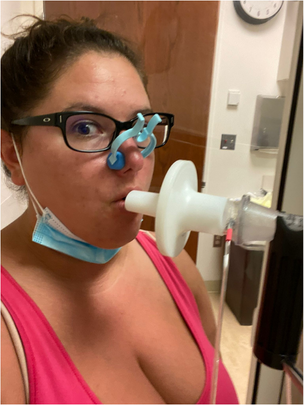
Has scleroderma affected your job?
I work from home, actually. My company has an office here in Chicago and before the pandemic, they had a hybrid system already. We’re encouraged to go into the office, but it doesn’t have to be set days or once or twice a week. We just show up every so often and just have to be involved if there’s in person meetings. But – I’ve been saying this a lot in the last few months – working from home has been the best thing for my health that I could have ever gotten.
In my previous job (prior to the pandemic), I was taking public transit downtown from where I live. It could be anywhere from a 40 minute to an hour commute depending on the train, and I’d do that 5 days a week. Being in the office was so incredibly difficult at times; dealing with a Raynaud’s attack, or having a really bad GERD episode where I’d need to go to the bathroom and throw up. Now being at home, if something does happen, I have all the tools available to manage it.
My mental health has improved because I’m not worried about those things as much. As difficult as it was to adjust the first year or so working from home, I just can’t imagine myself being back in an office ever. Sure like I said, going once in a while is fine, like I went last Wednesday. Or like today, I’m going to the Cubs game with my coworkers. But I just feel like I’m in the best place I’ve been in years with my health with WFH.
Have you communicated with your workplace about your scleroderma?
I really didn’t tell anyone at work because Illinois is an at-will state, so your employer can let you go for any reason. It could be for health, but they don’t have to tell you. Even if it’s illegal, they can just make up some excuse. I’m pretty sure that’s why I got let go from my previous job that I was at when I got diagnosed with UCTD 8 years ago.
I don’t have unlimited financial resources to lose a job or to not work. Giving too much information and someone using it against you has always been really scary to think about, so I wasn’t really open about it at work.
At the time in 2019, I kind of had to be open about it because I was asking for ADA accommodations, like with the Raynaud’s or with the GERD. I needed to have them provide a heater or a heated blanket for the office. It’s just so painful, having constant Raynaud’s attacks because it’s a corporate office. It’s a big building downtown, and the AC is blasting year-round. That’s kind of when I had to disclose more of my health stuff, but I’ve really been trying to keep it close to the chest.
I’ve been a little more open with this job working for my current employer. I haven’t disclosed a diagnosis, but my boss and other people know that I do have a chronic illness and that I’m constantly at doctor’s appointments. I’m very used to constant physical therapy, and nobody seems to mind. It could be part of the work from home culture, where as long as you get your work done and attend the meetings you need to be at, it doesn’t matter when you’re doing your work or if you’re staying up late to do it.
I’m very open about my health in the other areas of my life, with my family and friends. I’ll share it on social media, because I think that knowledge is power, and it also makes me feel less alone when I share. I found some people in online communities as well.
It’s kind of weird to be so open in every other area of my life and just to be so afraid of sharing at work, because like I said, I feel like I got let go from my previous job because of my health, and the ramifications of that are really bad. You lose your job, you lose your health insurance. You lose your health insurance, your health goes down the toilet when you already have a chronic health issue. I feel like if I continued to be open about my health at my current job, they’d be very accepting, but because of my past experience I’m very hesitant to do so.
Do you ever think that you’ll move away from Chicago?
No, not really. A combination of work, family, and health-related reasons are what’s keeping me here.
I grew up in northern Illinois, so Chicago has always been a part of my life. My parents lived closer to the city when they were younger. I had grandparents and great grandparents who lived and grew up in the city. To me, it feels like it’s always been home, even when I didn’t live here. And I’ve lived here almost 10 years.
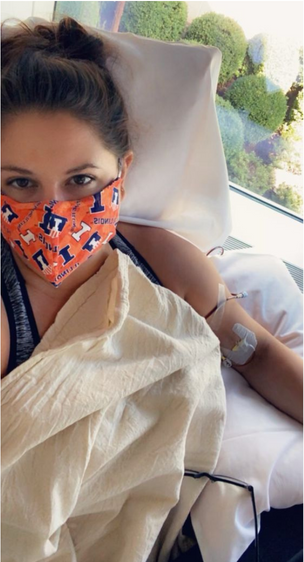
What do you enjoy doing in your free time?
I love sports, fitness and being active. That is a huge part of my life. It’s always been a part of my life. I come from a very active and athletic family. I had way more activities going on pre-pandemic. I did competitive powerlifting, triathlons, and marathons. I played sports all year-round.
How did the pandemic affect your sports and fitness hobbies?
During the pandemic, not being able to go to the gym was really hard, because I had to be really careful with my condition and wait for the vaccine. It hurt me mentally and physically.
I look back on it, and I’m like, “I could never do that again, being alone, sedentary, and scared for my health.” I’m trying to get back into the swing of things to the pre-pandemic times with all my activities.
What sports and fitness activities do you enjoy?
During the pandemic, I was only playing softball because it was pretty safe to be outside. I’ve kind of branched out in the summer. I’m on three or four softball teams, I’m picking up beach volleyball again, I started playing indoor volleyball again this year, and then I started doing ballet, which I did growing up for 16 years. I miss being a little more creative and graceful, and not always playing sports, so I’ve been doing that since January, and it’s been amazing and I can’t believe how much my body remembers – it’s like riding a bike.
I still lift pretty regularly (a few times a week), but it’s not as high of a priority as it was when I was competitively powerlifting. But I can always go back to it, since I have the skills required. It takes a lot out of your body playing softball as an adult, so I want to focus on that for a while before my knees can’t handle it anymore.
I swim. I bike. I run. I hate running, but I do it anyway. I bike everywhere in the warm months (Raynaud’s makes this nearly impossible for seven to eight months of the year). I’ve done two triathlons and I’d like to do another. I also enjoy going to sporting events or to Cubs games or going to football games in the fall.
When I was lifting (and doing crossfit), I did one Olympic lifting meet, but I hurt my shoulder training for that, and it’s too difficult on the knees. I’ve done four official powerlifting meets. My last one was in 2019 which I trained for by myself; back squat was 259, for deadlift I got 303 lbs. It was exciting to hit over 300. As for bench, I didn’t hit a PR at a meet, but my PR in the gym is like 150 or 160, I can’t remember. Sadly, I’m not even close to any of those right now… still strong though. It’s just a matter of determination getting back to that stuff. I know I can do it.
Staying active really helps me when things get tough. For people looking from the outside in, it would almost seem counterintuitive to be active. Like, “Oh, aren’t you in pain?” But once you stop being active, the pain is worse in my experience.
What else helps you get through difficult times?
Whenever things got painful and I needed to stay at home, I’d play video games. I have Lego sets. I do puzzles; I love doing crossword puzzles. I haven’t read a ton of books in a while… the last book I read was a book about Ebola in December, 2019. And then the pandemic happened, and I was like, “Oh, maybe I shouldn’t read a book again.” That was bad timing!
There’s also talking to people. Like I said, being very open about my health in my personal life is very helpful. I’ve been seeing my therapist for nine years now, I think. I think therapy helps a lot. Getting it out in the open instead of bottling it up really helps when things are bad.
Then, of course, friends and family. I feel like my family is very supportive and understanding of all my health issues. My friends have been pretty great and a good support network as well. When I was diagnosed in 2015, both my parents were there for me. My mom was on the phone with doctor’s offices, trying to get me in places. I didn’t have insurance, so she negotiated prices and stuff. She really just can step up when anything health related happens.
I actually made a really good friend that I met in the suburbs outside of Chicago. We went and grabbed dinner like a year ago. She doesn’t have scleroderma, but she has PoTS and other stuff. It felt so great to make this connection with someone and to be able to meet them in person. Just to be like, “I get it when you’re feeling this way.” We just have a ton in common, just like more nerdy stuff. It’s like I found someone I can really relate to. I feel very lucky to have all the people and pets in my life.
Has scleroderma stopped you from pursuing anything?
I don’t think there’s been a ton that I ever had to miss out on for my health. The only thing I can really think of is anything winter-related, like going skiing and stuff. I have to be beyond prepared, I have hand warmers, rechargeable ones, or the air activated ones. I’ve also got a heated foot sole thing to go into boots. Sometimes the GERD can be limiting in what kind of meals or foods I can eat, but I always find alternatives.
Then there’s outings and stuff I’ve had to turn down. My friends would say, “Hey! We’re going out for drinks. You want to come?” and I might have been in a flare where I just felt sick, my whole body hurt, and just didn’t feel like leaving the couch after work and that sucked — but I felt like it was always the right decision. Listen to your body. If you don’t, you’re gonna feel even worse. There hasn’t been anything super memorable that I had to say no to. It’s just been about choosing what to do and managing expectations.
What are your goals or dreams for the future?
I’d love to be able to buy a condo someday and would really like to have my own space. I’d also like to meet someone too, but dating is hard as it is, and with a chronic illness that’s always a concern. Like am I going to meet a guy who understands all of this and is accepting of it?
That would be a nice thing in my future, but that’s also something I’m learning to be okay without. Maybe it’s not in the cards for me. As it stands with my pets and my family and my friends, it’s pretty great, and it’s okay if finding a romantic partner doesn’t work out.
I’ve got a whole bucket list of things that I’d like to do. One of the things that had popped up in my mind recently that I had thought about pre-pandemic was this event called RAGBRAI, where you bike across the State of Iowa in the summertime. You start from the west end and ride all the way to the East End. That’s on my list.
I’ve been dying to go to Greece for years, and I’d like to take my mom as well, because we have Greek heritage and want to see if we can trace that when we’re over there, and just enjoy the country and everything it has to offer. I think that it would require more planning, but that’s definitely a goal or dream in the next maybe five years.
Is there anything that worries you moving forward?
I’m in a lot of medical debt. When I got diagnosed, I was in between jobs. This was in 2015. I left a job that was very toxic. I worked as a manufacturing engineer at the time. I just quit because I was like, “I can’t do this mentally.” I was having panic attacks every day. It’s not like I was expecting to be diagnosed with a chronic illness all of a sudden.
Before I knew it, I had a Raynaud’s attack, and then my finger started turning black. Everything was out of pocket, going to all these specialists. I had to go to the ER a few times. All this really set me back.
And at the time, I’d been doing Lyft and Uber just to make ends meet but had to stop because there was some medication I was on making me really dizzy. They were trying to treat the necrosis that was on my right index finger. I was so dizzy I could barely get out of bed and felt like passing out, and couldn’t operate heavy machinery (my car) safely.
Having experienced all this, it scares me what my future looks like, if I can’t come to a place where I can get all this debt under control, who knows what might happen. I know that a lot of people declare bankruptcy because of medical debt, and I’ve honestly considered it.
If I lose my job and then I can’t work… People go into poverty because of these things. Disability in this country is not a life of luxury; a lot of disabled people are homeless and you can’t have any more than $2,000 of any kind of asset otherwise you lose your disability “benefits”.
I need to do everything that I can, everything that’s available to me to try to be able to get ahead of this and start being able to think of how to plan my financial future if the worst were to happen while I’m gainfully employed, while I have health insurance, and while I can financially support myself. I know a lot of my friends who have chronic health illnesses feel the same way.
One horrible flare, any disease progression, one emergency, and next thing you know your whole life is ruined. It’s very stressful and disheartening to know that there is no support from your own government and fellow citizens, too.
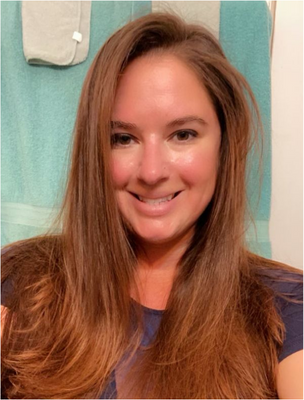
Could you please tell us about your experience with online groups?
I’m in two or three Facebook groups. I’m not super active in them though. Reading some of these people’s stories, things they’ve shared or questions they’ve asked, it kind of might put me down a rabbit hole of really anxious, scared thinking. Maybe if I’m feeling some new symptom, I’d go to see if it’s been posted about in the facebook groups and ask, “has anyone ever felt this way before?” and interact that way.
Also, I feel like I’m in the minority in these support groups. I’m single, in my mid thirties, unmarried, and I don’t want kids. A lot of people there talk about their marital relationships and kids, and how difficult it is to manage. It sounds exhausting, and I really feel for them, but I can’t relate. Being single and alone is a different struggle than having a family. I follow a lot of scleroderma-based accounts on Instagram too. That’s how this whole interview got set up. I also found that I’ve been following a lot more people my age who have scleroderma on Instagram, and it seems easier to relate to them on that platform compared to Facebook.
What is something you’ve learned that you wish you knew when you were diagnosed?
Probably that my diagnosis, my health, and all this stuff is not a moral failing. Yeah, it sucks, but it’s not a punishment for anything. You just gotta find the best ways to cope and live with it. It’s not like “You ate pizza the other day! Oh, you deserve it” or “Well, you’re not drinking kale smoothies. That’s why you got this.” I see this kind of thinking a lot in the fitness community, which is unfortunate. I didn’t do anything wrong to have PCOS or PoTS or scleroderma. I remember being in pain as a kid and the doctors had no idea what was wrong, and no child deserves health problems — so why should I feel that way as an adult? The best thing I can do for myself is to keep working through and keep fighting for myself.
What advice do you have for people with scleroderma or other chronic illnesses?
I’d probably say the same thing. Your health issues aren’t a moral failing. Never take no as an answer from a doctor. If a doctor isn’t listening to you, find another one. You are not obligated to stay with any healthcare provider. Even if they’re the best in their field, it’d be better to get someone who listens to you and is willing to do all the tests, all the work with you. Maybe they’re not as knowledgeable, but they’re willing to learn and treat you with respect and kindness.
The most priceless thing you can do is to be an advocate for yourself; if you have people, friends or family, who are also advocates with you, then that’s great too. Then you can share some of that burden. Just be nice to yourself. Be gentle with yourself. Do what you need to do to get through each day and that day only. Don’t worry about what’s coming up next, because there’s nothing you can do while you’re suffering or in a flare or whatever is going on. You have to just focus on getting through that day, and then look forward to the next one.
Be sure to follow us on Instagram and Facebook (@sclerounited) to see more scleroderma warriors’ journeys in our weekly Sclero Sunday series.
Are you a scleroderma warrior? We’d love to interview you for Scleroderma Stories! Please visit tinyurl.com/share-my-sclero-story or email us at contact@sclerounited.us
